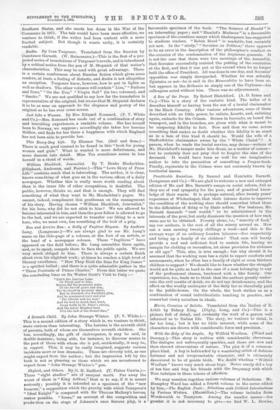Shylock, and Others. By G. 11. Radford. (T. Fisher Unwin.)—
These "eight studies" are of unequal merit. Far away the worst of them is "King Arthur," that is to say, if it is meant seriously ; possibly it is intended as a specimen of the new humour," a supposition which the gravity with which Tennyson'e "Ideal Knight" is compared with Sir Thomas Mallory's heroes, makes possible. "Irene," an account of the composition and prodintion on the stage of Johnson's once famous play, is a favourable specimen of the book. "The Sources of Hamlet" is an interesting paper ; and " Hamlet's Madness" is a favourable specimen of the countless essays which Shakespeare has suggested to studious readers. 'Robin Hoed" is readable, but certainly not new. In the "study," " Socrates on Politics," there appears to be an error in the description of the philosopher's conduct on the occasion of the condemnation of the Arginusce generals. It is not the case that there were two meetings of the Assembly, that Socrates successfully resisted the putting of the resolution at the first, and that it was put at the second when he no longer held the office of President. All was done in one day, and Socrates' opposition was simply disregarded. Whether he was actually Epistates or not—he is said in the Memorabilia to have been so, but appears in the Hellenica as simply one of the Prytanes—his colleagues acted without him. There was no adjournment.


















































 Previous page
Previous page